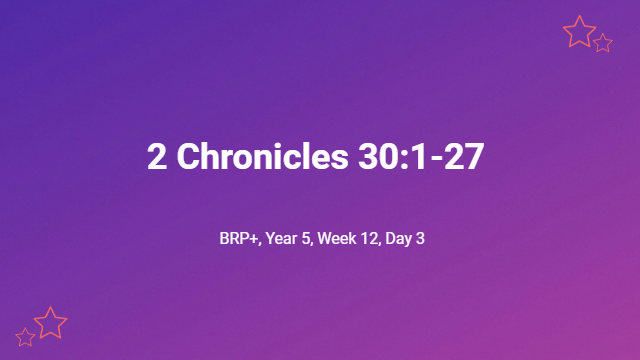2 Chronicles 30:1-27
Q.1. What slowed the restoration of the Passover? How did Hezekiah share his blessings beyond Judah? Was he wise to point out the failures of Israel? What was his view of God? – (2 Chr.30:1-9)
The celebration of the Passover became the beginning of the calendar year for Israel, after their exodus from slavery in Egypt (Ex.12:2). However – 2 the king and his princes and all the assembly in Jerusalem had decided to celebrate the Passover in the second month, 3 since they could not celebrate it at that time, because the priests had not consecrated themselves in sufficient numbers, nor had the people been gathered to Jerusalem (2 Chr.30:2-3 c.f. 2 Chr.29:34). This delay also gave the opportunity to invite the remainder of the tribes of Israel (all the way to Dan), who had survived the Assyrian invasion (2 Chr.30:1, 5-6). This was done by a personal written invitation from the king of Judah which challenged them to turn back to God, on the understanding that it was in His nature to bless them again – 8 Now do not stiffen your neck like your fathers but yield to the Lord and enter His sanctuary which He has consecrated forever, and serve the Lord your God, that His burning anger may turn away from you. 9 For if you return to the Lord, your brothers and your sons will find compassion before those who led them captive and will return to this land. For the Lord your God is gracious and compassionate and will not turn His face away from you if you return to Him.” (2 Chr.30:8-9). Hezekiah rightly summed up the character of God. He understood that God’s blessing started with repentance. Therefore, he could not avoid being honest about Israel’s failures.
Q.2. How did the tribes of Israel respond? How did they prepare for the Passover? How did God respond to the concession Hezekiah asked from the Lord? – (2 Chr.30:10-20)
Sadly, the king’s couriers were mocked and ridiculed by most of the tribal leaders (2 Chr.30:10). However, there were some wonderful exceptions – (they were noble-minded like the Bereans) – some men of Asher, Manasseh and Zebulun humbled themselves and came to Jerusalem (2 Chr.30:11 c.f. Acts 17:10-12). Hezekiah had the respect of his people. There was genuine unity of purpose, because – the hand of God was also on Judah to give them one heart to do what the king and the princes commanded by the word of the Lord (2 Chr.30:12 c.f. 30:4). They first removed the false worship from Jerusalem. The enthusiasm bubbled over. Many had ignored the Laws prescribed by Moses and had failed to consecrate themselves properly – For a multitude of the people, even many from Ephraim and Manasseh, Issachar, and Zebulun, had not purified themselves, yet they ate the Passover otherwise than prescribed (2 Chr.30:18). Hezekiah again revealed his understanding of the heart of God. He – … 18 prayed for them, saying, “May the good Lord pardon 19 everyone who prepares his heart to seek God, the Lord God of his fathers, though not according to the purification rules of the sanctuary.” (2 Chr.30:18-19). God did not stretch out His hand against the sons of Israel, but – the Lord heard Hezekiah and healed the people (2 Chr.30:20 c.f. Ex.24:11).
Q.3. How did Hezekiah, the Levites, and the people respond to the grace of God? What made this Passover so special? How do we know God was pleased? – (2 Chr.30:20-27)
The Levites provided magnificent songs and music (2 Chr.30:21). Throughout the weeklong Feast of Unleavened Bread, the people were full of joy. The king encouraged the Levites for the excellent leadership of the festival. He and the leaders added generously to the national feast which was enjoyed by all. Many priests repented and reconsecrated themselves once more (2 Chr.30:21-24). The blessing overflowed – 25 All the assembly of Judah rejoiced, with the priests and the Levites and all the assembly that came from Israel, both the sojourners who came from the land of Israel and those living in (2 Chr.30:27)

